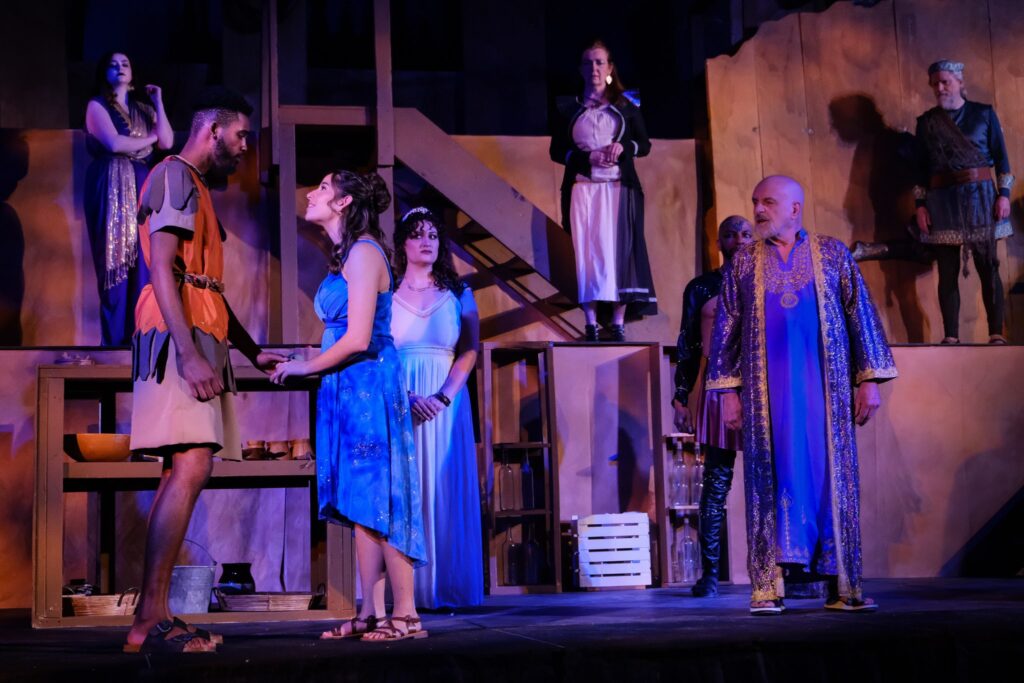Spectacular on Many Levels: Grapevine Theatre’s ‘Harmonia’

The perennial City of Wine offers its first full bloom with Harmonia, a tale of forbidden love between a goddess and a mortal. Harmonia is the first in the nine-play cycle by local playwright Ned Dickens, which the Grapevine Theatre Project plans to produce as a series over the next five years. After an enormous effort by a network of over 300 theatre lovers, Harmonia is the magnificent fruit of this grapevine’s labour. As I entered the Spire, the sanctuary was bustling with excitement, and it truly felt like a celebratory occasion.
Harmonia is, quite literally, spectacular on many levels. Shea Spafford’s three-level set fills the sanctuary, creating an epic Mount Olympus. These levels give the audience an immediate sense of the hierarchy on Olympus: the lowest is occupied by the Unnamed, a group of seven mortals enslaved by Ares, god of war. Among the Unnamed, we meet new arrival Cadmus (Seymour Irons), a captured prince who soon falls in love with the lofty young goddess Harmonia (Jessica Rosales). Their love is fraught with complication, and eventually the two are put on trial by the gods.
Gods and mortals alike give strong performances in Harmonia. Clad in gorgeous colours thanks to costume designer Claudia Wade, the deities strut about with panache, causing and (occasionally) fixing mayhem. In the echoey sanctuary of the Spire, the actors work hard to have their words sound clear, and they do a great job filling the space. I was especially impressed with Rosemary Doyle’s vocal tone—as Athena, her voice cuts through the space clearly and powerfully. As Hephaestus, Cassel Miles is likewise commanding.
Harmonia is full of subplots, and there are too many commendable performances to mention them all. Matthew Davis, playing the Unnamed character called “Bowl” in the program, is likeable as the everyman who stumbles into dealings with the gods. Katie Nora Ready-Walters, playing a naiad (water nymph) named Thebe, delivers her lines with a frank, innocent quality—a fresh splash of water that stands out from the grandiose tone of many other characters. The play is written with beautiful attention to rhyme and rhythm, and the actors deliver their lines lucidly—what could come out sing-songy sounds epic, even inspired.
Kevin Tanner’s lighting design is magical. From the natural to the supernatural, the lighting feels like an extension of the characters’ moods and environments. I loved the dappled textures, the hot red light in the love scenes, and the orange glow from the hearth on the bottom level of the stage, which decorates the high ceilings with the actors’ shadows.
Harmonia doesn’t shy away from sexuality, and for the most part it’s done well—raunchy, playful, and a little kinky. The intimate scenes, much like the fight scenes, are choreographed to be energetic and lighthearted. There is one scene that breaks this trend: a depiction of a god behaving violently toward a much younger woman who’s spurned his advances. I walked into this show knowing it was based on Greek mythology, so it’s not like I didn’t expect some amount of sexually charged violence. This was upsetting to watch, though, especially because it’s never really addressed in a meaningful way as the play goes on. The god goes back to his pantheon in the second act, delivers some funny lines, and the audience laughs. Meanwhile, the woman’s life is forever changed by his act of retaliation. That’s part of what bothers me: divine curses aside, this is exactly how it goes in real life, isn’t it? We don’t need to travel to Mount Olympus to see this.
If the intention of this scene is to unsettle the audience, it does its job well. However, so much theatre and film is already oversaturated with scenes where women are overpowered and debased for spectacle. It’s exhausting, especially for people who have experienced these things firsthand. I’m not saying it’s wrong for theatre to deal with violence and coercion—I understand that they’re aspects of life, and art wrestles with life, even (often especially) the ugly parts. Still, this scene doesn’t sit well with me—it feels unnecessary to the play’s storytelling.
In the program, Dickens writes, “The CoW (City of Wine) plays are not reverent translations of ancient texts. They are new, Canadian plays on ancient and universal themes.” Since Harmonia isn’t pressed to depict Greek mythology in all its ancient misogyny, I question the choice to write and direct the scene this way. Plenty of other events in Harmonia are told rather than shown, related through poetic monologues in a way that is engaging and artful. I can imagine a dozen other ways to incorporate this plot point without having the incident play out onstage the way it does. We’ve seen enough young women get pushed around and bullied. In 2023, I didn’t need to see more of this.
Misgivings aside, I do want to see more of the City of Wine cycle. I found Harmonia powerful and engrossing, and I’m looking forward to following the series as it continues. The final line of the play—which I won’t repeat here, so you’d better go hear it for yourself—made me deeply curious to see Pentheus (the next in the cycle) in 2024. Thank you, Grapevine Theatre, for a spectacular production of Harmonia. See you next spring!
Grapevine Theatre‘s ‘Harmonia’ closes Saturday, March 18 and you can find more information here.
This article was edited on December 1st, 2023 to update formatting.